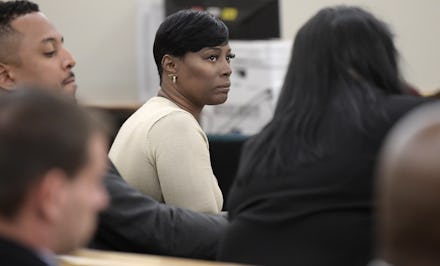Texas court rules against Crystal Mason, who was sentenced to 5 years for trying to vote

An appellate court in Texas has ruled against Crystal Mason, who was sentenced to five years in state prison for casting a provisional ballot in the 2016 general election. Mason was on supervised release for a previous federal conviction for fraud at the time and submitted her ballot on the advice of a poll worker. The court ruled not to overturn her conviction.
"A punishment of five years in jail for doing what I thought was my civic duty, and just as I was getting my family's life together, is not simply unfair, it's a tragedy," Mason said in a statement released by the American Civil Liberties Union of Texas.
Mason voted with a provisional ballot that, ultimately, was not counted. She was arrested and charged by the state of Texas for the action because prosecutors alleged she knowingly violated laws about casting a provisional ballot. The process includes signing an affidavit that says: "If a felon, I have completed all my punishment including any term of incarceration, parole, supervision, period of probation, or I have been pardoned.”
Individuals in Texas cannot vote until their full sentence has been cleared, which includes any parole or probationary period. Mason was on supervised release at the she submitted the ballot. During trial, Mason testified that she was unaware of this law.
By denying Mason's petition, the three-judge Fort Worth appellate panel affirmed her original conviction on the grounds of illegal voting. But advocates wonder how a charge of illegal voting could stand if Mason's ballot was ultimately not counted — in addition to questioning the state's claim that Mason willingly, knowingly broke the law.
"The fact that she did not know she was legally ineligible to vote was irrelevant to her prosecution," one judge, Wade Birdwell, wrote in the court's opinion. "The state needed only to prove that she voted while knowing of the existence of the condition that made her ineligible."
The ACLU of Texas disagrees. "Crystal submitted a provisional ballot that was not counted, she did not vote illegally," Tommy Buser-Clancy, a senior staff attorney for the organization, said in the statement.
Provisional ballots were created with the intention to counteract confusion and promote civic participation, advocates say. In Texas, Mason's criminal conviction is the first of its kind. In 2016, of the 3,990 provisional ballots that were rejected in her county, it was only Mason who faced criminal prosecution.
Voting rights advocates worry that this judgment might pave the way for similar prosecutions in the future. After all, intimate knowledge of election and voting law, especially in individual states, isn't exactly common. In Texas, even voters with no criminal conviction have to navigate quite the set of hurdles to vote, such as registration requirements, inaccessible polling places, or long wait times.
Mason's attorneys say they will ask that the full Court of Appeals to review the lower court's decision. "The worst possible message that could be sent right now is that you can go to jail for trying to participate," Beth Stevens, the legal director for the Texas Civil Rights Project Voting Rights Program, said in the statement. "We continue to stand with Crystal and will keep fighting for her."